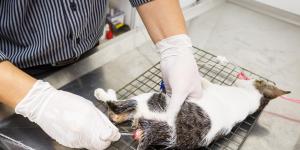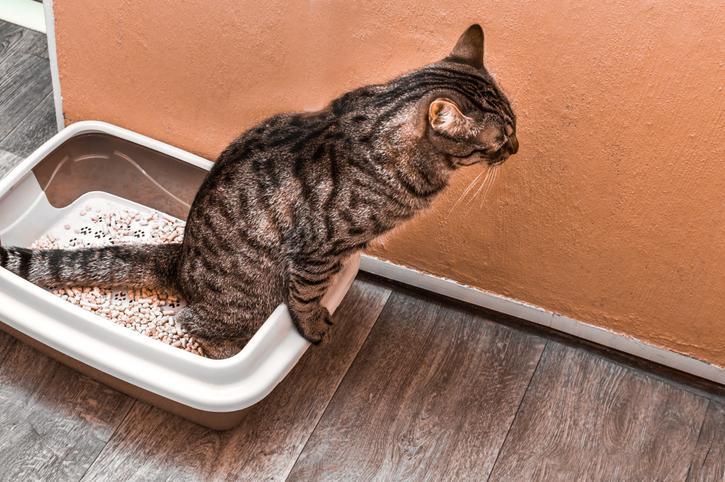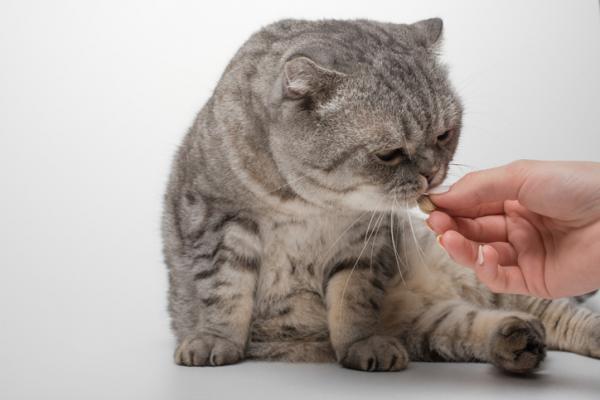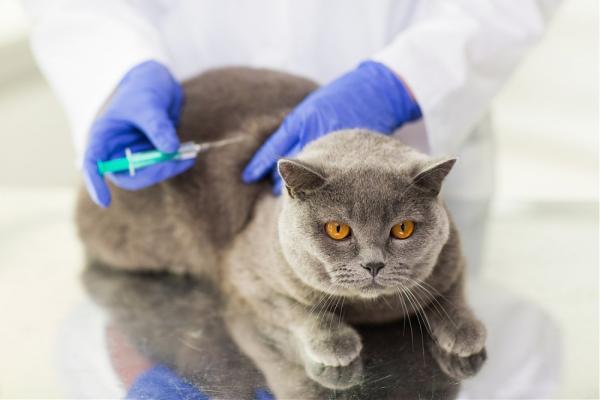Enteritis in Cats - Symptoms, Treatment and Prevention



See files for Cats
Enteritis in cats is the inflammation of the small intestine. Whereas some enteritis is completely treatable and easily preventable, there are others that are more difficult to treat.
In this AnimalWised article we're going to explain what is enteritis in cats, as well as the symptoms you should watch out for, the different causes, treatment and how to prevent your cat from ever getting enteritis. Keep reading to learn more about this feline disease.
What is enteritis in cats?
Feline infectious enteritis (FIE) is a disease caused by infection with feline parvovirus (FPV), also known as feline panleukopenia virus. On many occasions the stomach is also affected, in this case being called gastroenteritis.
What causes enteritis in cats?
In many cases, the cause lies in the cat eating or drinking something contaminated, in poor condition or ingesting a foreign body, often from the garbage. The latter in cats is not usually as frequent because they are more selective. Other causes of enteritis or gastroenteritis in cats are:
- Coccidia (Isospora spp.)
- Protozoa (Giardia spp., Tritrichomonas fetus, Toxoplasma gondii or Cryptosporidium parvum)
- Parasitic worms (Toxocara cati, Toxascaris leonina, Dipylidium caninum, Ancylostoma tubaeformae)
- Enteropathogenic bacteria ( Campylobacter jejuni, Salmonella, Escherichia coli and Clostridium)
- Inflammatory bowel disease (IBD)
- Food hypersensitivity
- Plant poisoning
- Feline coronavirus
Symptoms of enteritis in cats
The symptoms of enteritis in cats can vary depending on the cause of the intestinal inflammation. They could be as follows:
Symptoms of food poisoning enteritis
In cases of acute enteritis or gastroenteritis due to ingestion of contaminated food or water or foreign bodies, the main symptoms are:
- Acute vomiting and/ or diarrhea that may be watery, urgent and bloody
- Anorexy
- Lethargy
- Mild abdominal pain
Symptoms of coccidiosis enteritis
Isospore coccidiosis does not cause symptoms in adult cats, but in young cats it causes enteritis with clinical signs such as:
- Watery diarrhea
- Vomiting
- Loss of appetite
- Discomfort.
- Dehydration
- Weakness
Symptoms of Feline Panleukopenia Enteritis
Feline panleukopenia virus (also known as feline infectious enteritis) causes severe enteritis with:
- Decrease in white blood cells
- Fever
- Depression
- Anorexy
- Severe vomiting
- Bloody diarrhea
Feline enteric coronavirus generally causes mild self-limiting diarrhea in kittens. The problem lies when this virus mutates and produces devastating feline infectious peritonitis.

Symptoms of protozoan enteritis
In cases of enteritis caused by protozoa, symptoms may vary:
- In giardiasis, although many are asymptomatic, in others there may be highly variable clinical signs, ranging from acute, foul-smelling, mucus diarrhea to diarrhea with alternating normal stools, with weight loss and sporadic vomiting.
- In Tritrichomonas fetus, the last segment of the small intestine is usually affected along with the colon. Cats develop chronic large bowel diarrhea that does not stop with common antibiotic or antidiarrheal treatments and can progress to foul and watery small bowel diarrhea.
- Cryptosporidium parvum infections do not generally cause diarrhea, as Toxoplasma gondii does. However, certain small or immunocompromised kittens with enteritis may experience vomiting and/ or diarrhea.
Symptoms of enteritis from other diseases or parasites
Depending on the disease or parasite, symptoms may be the following:
- Parasitic worms: parasitic worms typically cause weight loss, vomiting, diarrhea, dull coat, and abdominal discomfort. In the specific case of hookworms, anemia will also occur with pale mucous membranes and blood in the stool.
- Bacteria: enteropathogenic bacteria cause acute or chronic diarrhea in cats, being much more visible in young cats of communities or immunosuppressed. The enterotoxins in some of them can directly affect intestinal tissue or promote fluid and electrolyte secretion through interaction with mucosal receptors. They can also affect the large intestine causing acute enterocolitis with mucous stools, urgency to defecate and bleeding, along with vomiting, fever, and anorexia.
- Inflammatory bowel disease: chronic anorexia, diarrhea, and vomiting often occur in inflammatory bowel disease.
- Food hypersensitivity: cats with food hypersensitivity can be affected by both gastrointestinal signs and skin signs with itching and external otitis.
As always, it's very important to take your cat to the veterinarian as soon as we see them experiencing any of the symptoms mentioned above or any other abnormality. As you can see, the treatment and severity of their illness will depend on what caused their enteritis. This is why it's so important to take them to the veterinarian as soon as possible to be professionally examined and treated. Keep reading to learn about what treatment your cat may need.
Diagnosis of enteritis in cats
To diagnose acute enteritis or gastroenteritis due to ingestion of contaminated food or water or foreign bodies, anamnesis must be taken, the absence of a cause for this symptomatology and the rapid response to symptomatic treatment must be demonstrated. To do this, you must do the following:
- Stool analysis and smear: In the diagnosis of parasitic enteritis, a stool analysis and smear should be done to diagnose Tritrichomonas fetus and giardiasis. The latter infection can be seen by a fecal flotation with zinc sulfate.
- Stool culture: In bacterial enteritis, fresh stool culture or fecal cytology is useful for the diagnosis of Campylobacter jejuni or Clostridium spores.
- Stool analysis: stool analysis is performed to detect parasitic tapeworms, roundworms, and hookworms.
- Diet change: the diagnosis of hypersensitivity to food is made by feeding the cat a diet with hydrolyzed or novel protein for a time, and returning to the previous diet to confirm it if the clinical signs return.
- Biopsy and ultrasound: to diagnose inflammatory bowel disease, an intestinal biopsy and ultrasound should be performed.
- Other specific tests: specific tests are carried out for the diagnosis of viral enteritis due to the Panleukopenia virus and the feline coronavirus.
Treatment of feline enteritis
Depending on the root cause, treatments for enteritis in cats will consist of:
- Supportive treatment: the treatment of acute enteritis or gastroenteritis due to ingestion of contaminated food or water or foreign bodies consists of supportive therapy until the clinical signs subside based on water and an easily digestible diet, fluid therapy and antiemetics.
- Antiparasitic treatment: the treatment of giardiasis consists of applying an antiparasitic treatment with metronidazole or fenbendazole and decontamination of the environment by cleaning and disinfecting the environment with quaternary ammonium compounds. For its part, Parasitic worm infections are treated with different types of antiparasitics depending on the causative pathogen.
- Sulfadimethoxine: coccidioses are treated with sulfadimethoxine.
- Antibiotics: therapy for bacterial enteritis will consist of the use of antibiotics, according to the results of the antibiogram. They are only used if there are very serious symptoms or that do not stop in a Salmonella enteritis, due to the development of antibiotic resistance. The treatment of inflammatory bowel disease also consists of the use of antibiotics such as metronidazole and a novel diet for a minimum of two weeks, and the use of drugs such as prednisolone if the disease is more severe or does not respond to the above. If they do not respond well to this treatment, immunosuppressants such as chlorambucil are added.
- Elimination diet: to treat food hypersensitivity, an elimination diet with hydrolyzed or novel protein should be chosen.
For its part, feline panleukopenia has no specific treatment, so, due to its high contagion capacity, the cat should be isolated and treated with broad-spectrum antibiotics and fluid therapy for dehydration.
Once your veterinarian as thoroughly examined your cat, they will know what caused the enteritis in your cat and which treatment will suit them best. Follow their guidelines as close as possible to ensure that your cat has the best opportunity of recovering.

Prevention of feline enteritis
The best way to prevent viral and parasitic enteritis is through vaccination and deworming, respectively:
- Deworming: internal and external deworming should be done at least three times a year, whether they go outside or not.
- Vaccination: vaccination of panleukopenia is carried out together with herpesvirus and calicivirus, in the feline trivalent or triple viral vaccine. The first dose should be given at 6-8 weeks of age, with revaccination every four weeks until week 16. Cats at risk should be revaccinated annually, others should be revaccinated every three years.
Plant poisoning can be prevented by preventing our feline from being in contact with any of the plants toxic to cats. Contamination of food or water can also be prevented by frequently cleaning the containers and feeding them with quality food, as well as preventing them from rummaging through garbage or ingesting some type of foreign body.
For its part, inflammatory bowel disease and food hypersensitivity cannot be prevented, but it is possible to take our cat to the vet in the presence of any symptoms indicative of enteritis such as diarrhea, vomiting, anorexia and weight loss, so they can be properly diagnosed and treated as soon as possible.

This article is purely informative. AnimalWised does not have the authority to prescribe any veterinary treatment or create a diagnosis. We invite you to take your pet to the veterinarian if they are suffering from any condition or pain.
If you want to read similar articles to Enteritis in Cats - Symptoms, Treatment and Prevention, we recommend you visit our Intestinal problems category.
- H. Quiroz. (2005). Parasitology and parasitic diseases of domestic animals. Limusa Noriega editors.
- I. Ferrero. (2015). Acute parasitic gastroenteritis in the cat . Available at: https://www.infovet.es/veterinario-Gastroenteritis-agudas-parasitarias-en-el-gato-109.php
- Harvey, A., Tasker, S. (Eds). (2014). Feline Medicine Manual . Ed. Sastre Molina, SL L ́Hospitalet de Llobregat, Barcelona, Spain.








